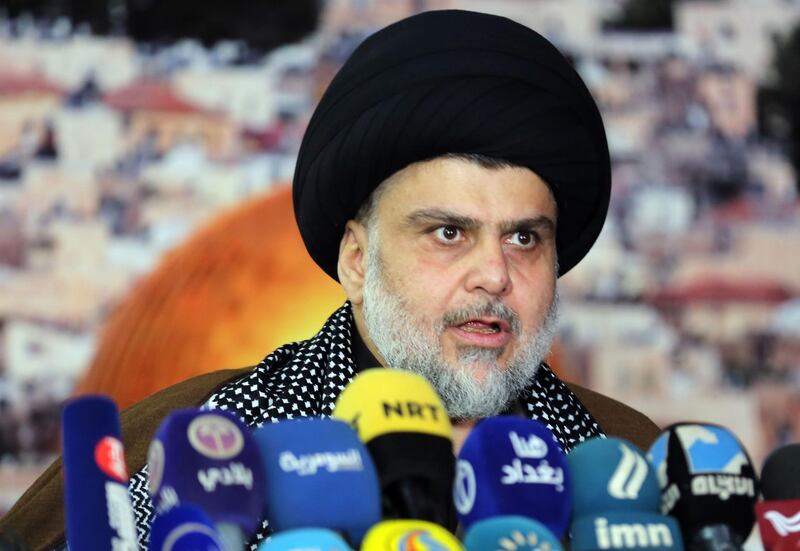Iraq’s top Shiite cleric on Monday ordered his fighters to hand state-issued weapons back to the government following the country’s defeat of ISIL.
Moqtada Al Sadr’s fighters, Saraya Al Salam, or Peace Brigades, took up arms against the extremist group in 2014 after the fall of Mosul and are officially part of the government-sanctioned Popular Mobilisation Forces (PMF), also known as Hashed Al Shaabi.
In a televised statement, Mr Al Sadr called on his fighters to also hand over parts of the territory they control to Iraq’s security forces. He maintained, however, that his fighters would remain present as protectors of a holy Shiite shrine in Samarra, north of Baghdad.
He also demanded that the government "looks after the families of the martyrs" who fell during the three-year war against ISIL.
Mr Al Sadr demanded that his fighters, drawn largely from among the urban poor of Baghdad and southern Iraqi cities, be given jobs or be incorporated into the official armed and security forces.
Iran has armed and trained many PMF groups in Iraq but not Mr Al Sadr's Saraya Al Salam.
Iran-backed 'Harakat Hezbollah Al Nujaba', which has about 10,000 fighters and is one of the most important militias in Iraq, announced last month it would give any heavy weapons in its possession to the military once ISIL extremists were defeated.
Mr Al Sadr urged Iraq’s prime minister Haider Al Abadi to prevent leaders of the Iranian-backed Hashed Al Shaabi from running in the upcoming elections and to launch an investigation into the fall of Mosul.
Iraq is set to hold general elections in May and a number of Hashed Al Shaabi leaders have indicated their desire to run, despite Mr Al Abadi asserting that political factions with armed groups would not be allowed to participate in the elections.
“We ask the Iraqi government not to allow the Hashed Al Shaabi, under any circumstances, to participate in the elections, and to prevent PMF leaders from running,” Mr Al Sadr said.
On Saturday, Mr Al Abadi, announced the liberation of all Iraqi territories from ISIL extremists.
"The dream of liberation is now a reality,” he said. Mr Al Abadi's announcement followed a victory parade in Baghdad, with Iraqi army units marching through the main square in central Baghdad as helicopters and fighter jets flew overhead.
ISIL militants seized control of large parts of Iraq and neighbouring Syria in 2014, declaring a cross-border "caliphate" and committing widespread atrocities. At their height, the extremists threatened the country's very existence.
With backing from a US-led coalition, Iraqi forces gradually retook control of all territory lost to ISIL over the last three years.
Baghdad now not only faces pressure over the daunting challenge of reconstruction, but also over the future of Hashed Al Shaabi. Although it is officially part of the government forces, they are seen by the United States and Gulf Arab states as a potential tool for Iranian plans to expand its influence in the region.
Last week, a powerful Iran-backed Iraqi militant commander was filmed visiting the Lebanon-Israel border and expressing support for the Lebanese and Palestinians against Israel.
Qais Al Khazali of the Iran-backed Asaib Ahl Al Haq, or League of the Righteous, a group that staged spectacular attacks against US troops before their withdrawal from Iraq in 2011, appeared in military uniform in a video while touring the border with Israel along with members of Lebanon's militant Hizbollah group, which is also supported by Iran.






